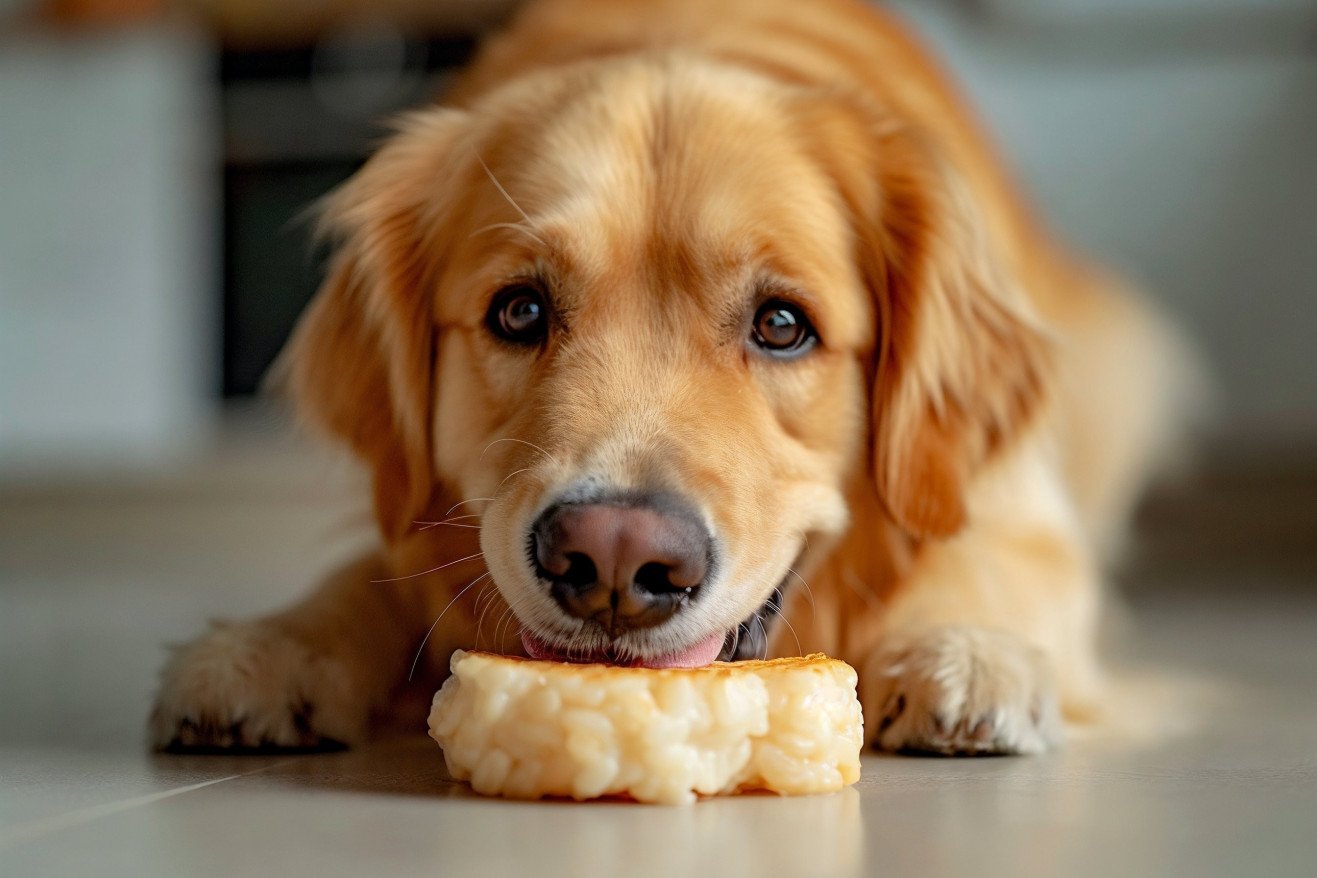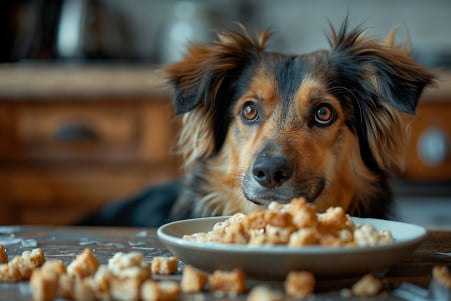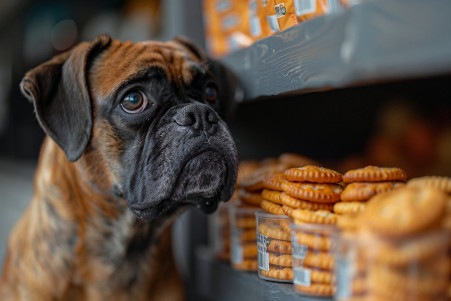Can Dogs Eat Rice Cakes? Understanding Safe Snacks for Your Pooch
10 February 2024 • Updated 9 February 2024

Rice cakes are a popular snack for humans, but can dogs partake in this crunchy treat? Dogs can have plain, unsalted rice cakes in moderation since they are safe and low in calories. That said, rice cakes should not be a staple in a dog’s diet, and dogs should not eat rice cakes that are high in salt or seasoning because they can be harmful.
Our in-depth investigation will take a closer look at veterinary opinions and scientific research to help you understand how rice cakes can impact your dog’s health. You’ll learn about how a dog’s body breaks down different ingredients, the importance of a well-rounded diet, and the potential risks of some common food additives.
By the end of this article, you’ll have the information you need to decide whether or not rice cakes can be part of your dog’s diet while keeping their health and happiness in mind.
Can dogs eat rice cakes?
Can Dogs Eat Rice Cakes? They’re Safe, but Not Nutritious
Rice cakes are made from puffed rice and are best known for being low in calories and having a short list of ingredients. According to Therapy Pets Unlimited, unsalted rice cakes are not toxic to dogs, but they are not very nutritious.
They should make up no more than 10% of a dog’s daily calorie intake. This is because they don’t contain the proteins, fats, and complex carbohydrates that dogs need in their diet.
Hepper explains that when it comes to treats, including rice cakes, they should be bland and low in salt to be safe for dogs. In the case of rice cakes, this means that they are mostly a low-calorie treat that doesn’t offer much in the way of nutrition. If dogs eat too many rice cakes, they can become lethargic and won’t get the nutrients they need.
While rice cakes can be given to dogs as a treat, there are other treats that are better for them. For example, A-Z Animals recommends giving dogs blueberries or strawberries, which are more nutritious and can provide them with antioxidants and vitamins.
In short, while dogs can eat rice cakes in moderation, they shouldn’t be a regular part of a dog’s diet because they don’t offer much nutrition. Instead, dog owners should focus on feeding their pets a balanced diet that will help them stay healthy and happy.
Complete and Balanced Diets and AAFCO Standards
A dog’s diet plays a major role in their overall health, and it should be made up of proteins, fats, carbohydrates, vitamins, and minerals. Proteins are essential for growth and repair, while fats are important for energy and the absorption of certain nutrients.
Carbohydrates are less essential but still important for energy and gut health. According to the Association of American Feed Control Officials, a complete and balanced diet for dogs should meet specific nutritional requirements to support the dog’s overall health.
When it comes to the nutritional value of the carbohydrates in a dog’s diet, this includes the carbohydrates found in rice cakes. According to VCA Animal Hospitals and PetMD, dogs can digest carbohydrates, but they are best when they come from complex carbohydrates in whole grains that have been cooked to make them easier to digest.
Simple carbohydrates like those found in rice cakes can provide a quick source of energy, but they don’t offer much in the way of nutritional value.
Dogs have different nutritional requirements at different stages of life. Puppies need a diet that supports their fast growth, while adult dogs need a complete and balanced diet that supports their overall health.
Senior dogs may need a diet that’s lower in calories and that helps them manage certain health issues. The ASPCA warns that an unbalanced diet can lead to obesity and nutritional deficiencies, so it’s important to make sure that the food you choose for your dog is appropriate for their life stage and meets AAFCO standards.
A well-chosen treat can supplement a dog’s diet and can also be used as a positive reinforcement tool in training. However, it’s important to make sure that the treats you choose for your dog are appropriate for their nutritional needs.
Getting the Most Out of Treat Training
Treat training is a popular method used by dog obedience and behavior professionals. The American Kennel Club explains that treat training involves giving dogs treats as a reward for good behavior, taking advantage of dogs’ natural instinct to work for food.
The key to this type of training is the treat that’s used. The best treats are small, soft, and have a strong taste and smell that dogs find irresistible. This makes it easier for dogs to eat the treat quickly and stay focused during training.
While rice cakes are safe for dogs to eat in moderation, they may not be the best option for training treats. Their lack of flavor and dry texture make them less appealing to dogs than other treats. All Stage Canine Development notes that boiled chicken and small pieces of cheese are good examples of treats that have a strong smell and taste that make them higher value treats.
To make sure that you’re getting the most out of treat training, it’s important to make sure that you’re using treats in a way that’s healthy and sustainable. Dog trainers in Sacramento suggest that you switch up the treats that you use to make sure that your dog stays interested and that you make sure that the treats are appropriate for your dog’s size to help manage their weight.
By choosing high-value treats and using them in a way that’s responsible, dog owners can help their pets learn while also supporting their health.
Watch Out for Dog Treats: The Additive Warning
When you’re shopping for rice cakes for your dog, it’s important to watch out for food additives and flavorings that can harm your pet. A warning from the Union Lake Veterinary Hospital notes that dangerous preservatives like BHA and BHT, which are known carcinogens, and Ethoxyquin, a pesticide, can cause liver or kidney failure. Xylitol, a sugar substitute, is especially dangerous for dogs, and even small amounts can cause hypoglycemia or liver failure.
The Dog Food Advisor also notes that there are potential long-term toxicity issues with artificial preservatives like Ethoxyquin, BHA, and BHT in dog food. To make sure that you’re avoiding these additives, make sure to check the labels and only buy plain, unflavored rice cakes.
For healthier treat options, look for treats that are made with natural ingredients like real meat, fruit, or vegetables. If your dog eats flavored rice cakes that contain any of the toxic ingredients, make sure to get them to the vet right away. By being careful about the treats you buy, you can help your dog avoid health problems and help them stay healthy, including maintaining a healthy digestive system.
Digestive Concerns and Metabolic Impact of Rice Cakes in Dogs
While the canine digestive system can handle carbohydrates, including those found in rice cakes, the effectiveness of this process can depend on the breed and size of the dog. A study published in the journal PMC found that larger dogs may have different carbohydrate digestibility due to differences in their gut microbiota and higher colonic permeability when compared to smaller dogs.
This shows that it’s important for dogs to have a diet that is tailored to their individual digestive needs.
Another important factor to consider when it comes to the impact of rice cakes on dogs is the glycemic index (GI) of the food. A study published in the journal PMC on nonracing sled dogs found that the macronutrient composition of dog food can change the way that simple carbohydrates, like those found in rice cakes, impact blood glucose levels.
Because rice cakes have a high GI, they should be given in small amounts to avoid spiking a dog’s blood sugar levels, which can be especially problematic for dogs that are diabetic or overweight.
When giving dogs treats like rice cakes, it’s important to consider these digestive and metabolic factors to ensure that you’re supporting their overall health and well-being. By making sure that your dog’s diet is tailored to their individual needs, you can make sure that they are getting the right balance of nutrients and energy.
Final Thoughts on Dogs and Rice Cakes
As we’ve learned in this article, dogs can eat rice cakes as long as they are given in moderation and are free of any additional seasonings or high sodium levels. According to Therapy Pets Unlimited, the blandness of rice cakes means that they can be a good treat option in moderation. However, they should not make up more than 10% of a dog’s daily caloric intake because they don’t have much nutritional value.
It’s important to make sure that dogs are getting a well-rounded diet, and while rice cakes aren’t harmful, they don’t replace the proteins, fats, and complex carbohydrates that dogs need. Hepper says that it’s important for dog owners to make sure that they are giving their pets treats that meet their nutritional needs, and plain rice cakes are the only option that fits the bill.
It’s up to pet owners to make the best choices for their dogs when it comes to their diets. The bottom line is that rice cakes can be given to dogs as a treat as long as they are given in moderation and a well-rounded diet is always the priority.
If you have any questions about whether rice cakes are a good option for your dog’s diet, or how to incorporate them into your dog’s diet, it’s always best to talk to your vet. This will help ensure that your dog is healthy and happy for years to come.


